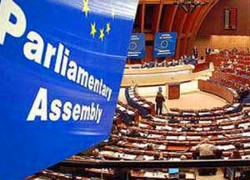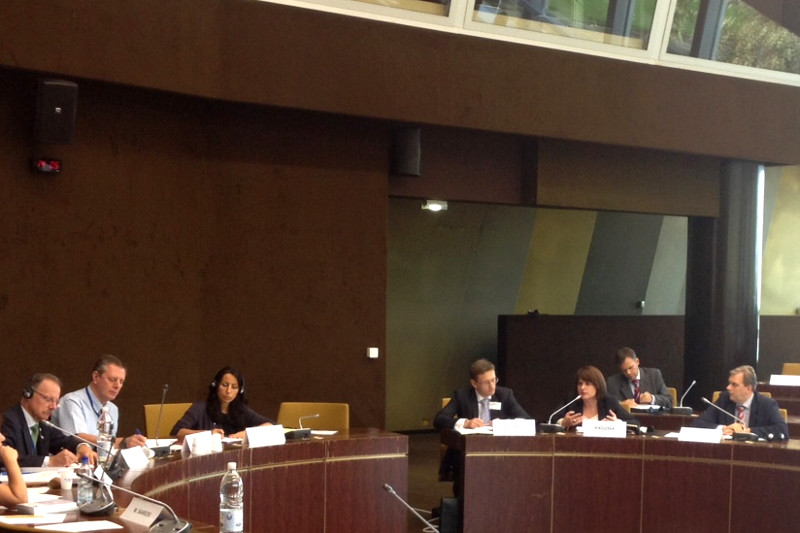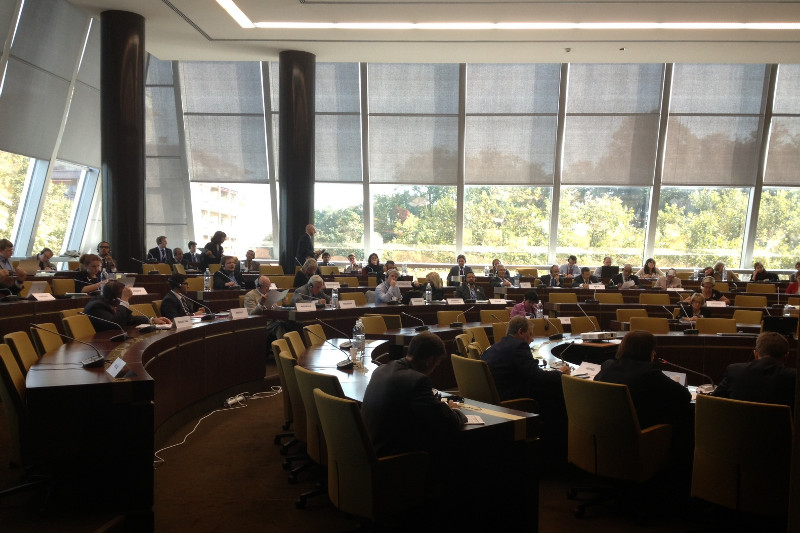PACE’s vice-president: “Usurper Lukashenka has thrown Belarus off to the Middle Ages”
44- 3.10.2013, 7:44
- 70,482

A discussion of the situation with human rights in Belarus took place at the Political Committee of the Council of Europe.
The charter97.org web-site’s editor-in-chief Natalia Radzina and Movement for Freedom’s deputy chairman Ales Lahviniec reported at the PACE Political Committee’s session. The session was presided by the head of the Political Committee of the Parliamentary Assembly of the Council of Europe Björn von Sydow, it was attended by PACE’s vice-president Emanuelis Zingeris, special rapporteur on Belarus Andres Herkel, the Committee’s members, the representatives of the Council of Europe’s secretariat and Council of Europe’s permanent member-states. The session was also attended by a representative of Belarus’ embassy in Paris, who came specifically for the event.
As a former political prisoner in her report Natalia Radzina first of all spoke about the situation over political prisoners: 11 political prisoners are currently remaining in custody. They undergo tough pressure, get deprived of meetings, parcels, medical care. Mikalaj Autukhovich cut his stomach open protesting against the pressure on the part of the prison’s administration; Jauhien Vaskovich is constantly kept in a penal cell, in almost 2.5 years he spent 200 days in a penal cell; Mikalaj Statkievich reports that the prisoners of conscience are threatened with being raped. The political prisoners, who get released due to the expiration of their prison terms, are significantly limited in their civil and political rights. The authorities of Belarus use the Soviet totalitarian experience and forced psychiatric and treatment is used among other methods of fighting dissent as well as alleged treatment of alcoholism as it was the case of Vasil Parfiankou.
New political prisoners have appeared recently – an activist Andrej Hajdukou, who was accused of espionage and a Catholic priest Uladzislau Lazar, accused of state treason.
“When after the elections of 2010 I, a journalist, was accused or organizing mass disturbances and I was facing up to 15 years in prison, I thought that it could not be worse. But as you can see, the regime stops at nothing: even priests are thrown in prisons, and the charges against dissidents are more and more flagrant”, - charter97.org’s editor-in-chief noted.
Natalia Radzina urged the Council of Europe to be principled and responsible and by no means give the status of a special guest in the Council of Europe to the dictatorial Belarus.
“The Council of Europe is an organization able to influence the Lukashenka regime. You were principled in 1997 when you deprived Belarus, that took the path of dictatorship, of the special guest status. This status should be by no means restored today.
Bargaining with the Lukashenka regime is immoral today. It is unacceptable to demand fulfilling only one conditions – introducing a moratorium on death penalty – and restore the dictatorship’s special guest status in exchange. Even if a moratorium on death penalty was introduced, there still will be out-of-court executions and murders. The regime of Lukashenka murders not only oppositionists and journalists, but out-of-favor businessmen, officials and even special service agents too.
It is not the fulfillment of one of two conditions that should be asked for, it is carrying out systemic political changes that should be demanded. The actual leverage of influence on the Lukashenka regime should be used. Such leverage today is not only visa restrictions, but targeted sanctions against oligarchs and their businesses, which trade on oil products majorly in Europe. Use your influence within the EU in order to block the sources financing Lukashenka’s repressive machine.
Otherwise the situation will not change in Belarus. Every time when you meet the representatives of the illegitimate parliament totally controlled by Lukashenka, you legitimize the dictatorship. Every time as the Council of Europe’s experts meet and give seminars for the representatives of the law enforcement agencies and special services of Belarus, as it was the case in July this year, you encourage the dictatorship for repressions against Belarusian people”. - Natalia Radzina noted.

Movement for Freedom’s deputy chairman Ales Lahviniec also noted that the situation had been deteriorating in Belarus. In particular, according to him, the new amendments to the country’s electoral Code cause concern. Their adoption would allow for increased censorship of oppositional candidate’s agitation materials. The creation of another level of electoral commissions would also not add to the transparency.
Today, according to the politician, the authorities of Belarus do not follow the demands of the Council of Europe in the human rights domain, coming to nothing more than signing technical conventions.
“The authorities pick the simplest things out of the Council of Europe’s menu that in no way influence the situation. The regime intentionally forgets the Council of Europe’s main conventions, but looks for the conventions, which would create no obstacles for its existence, in order to show some kind of good will.
For example, the authorities join the convention on the prevention of trade in people. Thanks to Natalia Piatkievich they have been overaccentuating this issue for several years already. Such steps should be welcomed, but welcomed reservedly. Technical steps should be reciprocated with small technical steps in order to preserve the communication channels. There may be a dialogue, but it should be conditional and start after the authorities of Belarus have taken certain specific steps.
The Council of Europe is a democratic organization and the membership should meet a number of criteria. There is the main criteria – the introduction of the European Convention on Human Rights, added to that are free elections, the cancellation of death penalty and the introduction of the Charter of Local Self-Government. It is also important to add the fifth step – to join the convention on the prevention of torture. If we look at the current situation with the Council of Europe’s cooperation with Belarus in a broader sense, it seems to me that it is much better to use the existing tools in order to broaden the dissemination of Council of Europe’s idea in Belarus: it would be the use of the Council of Europe’s information point, the possibility of greater cooperating with less-engaged people – university students, lawyers, human rights activists”, - Ales Lahviniec believes.
The Council of Europe Parliamentary Assembly’s vice-chairman Emanuelis Zingeris spoke at the session:
“Thanks for finally inviting actual representatives of the people of Belarus to PACE hearings. Since 1994 Lukashenka has started taking steps to usurp the power. Now the methods that he uses remind of the Middle Ages. Natalia Radzina, who is present here, was asked in the KGB prison what for she had met the president of the European Parliament Erzy Buzek. These are the methods of the Soviet KGB! Answer the question: who is working with this criminal regime in the Council of Europe today?
Who holds meetings with them, who arranges seminars for them? The representatives of the criminal Belarusian regime should not even cross the border of the European Union!
Yes, European countries feel the pressure of Belarusian special services today. But we should ask ourselves the question: what can be done with Lukashenka, who has usurped the power, who is holding political prisoners in custody and shots people after an unjust trial. We should find the means, real leverage of pressure on the criminal regime of Lukashenka”, - Emanuelis Zingeris stated.
After the session the head of the Council of Europe’s Political Committee Björn von Sydow commissioned the respective bodies with the task of carrying out an inspection on the fact of the visit of Council of Europe’s experts to Belarus on 22 July and their meeting with the representatives of KGB, the Ministry of Internal Affairs and Belarus Prosecutor General’s office.
In the framework of the visit to Strasbourg Natalia Radzina and Ales Lahviniec also met the PACE’s special rapporteur on Belarus Andres Herkel, the members of the Council of Europe’s General Secretariat on Support for Civil Society and the Council of Europe’s Department on Political Issues.









